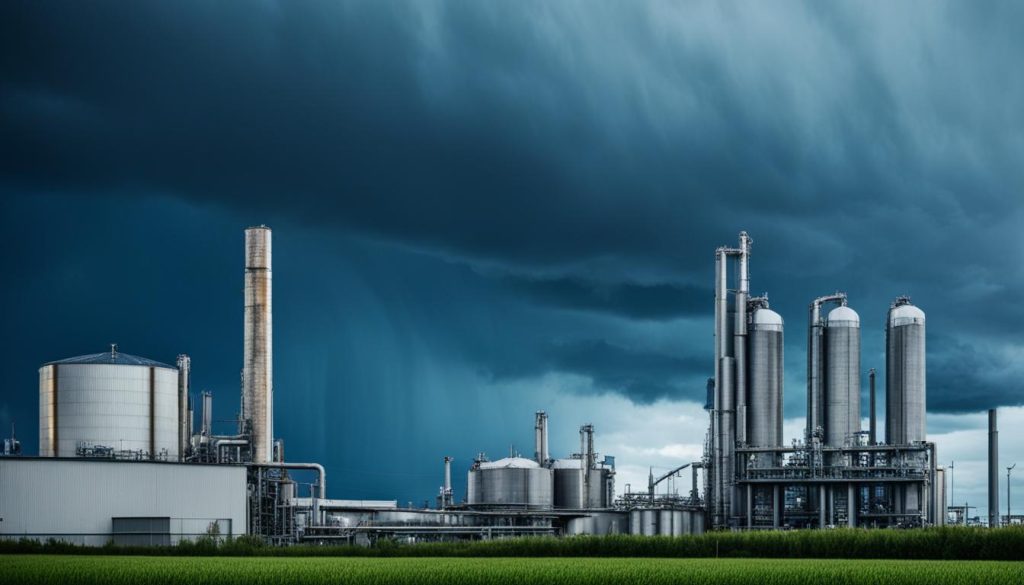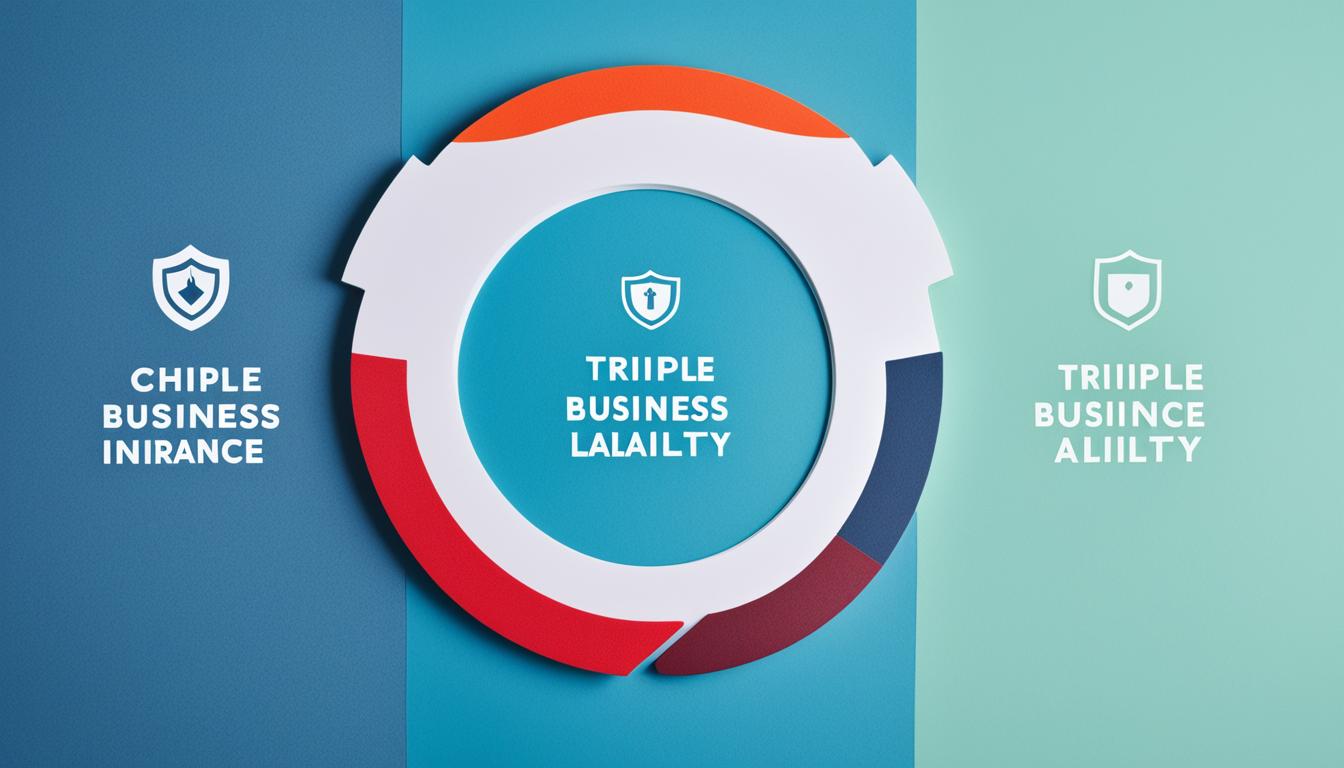Business insurance is crucial for any business, regardless of its size or industry. It provides financial protection in the face of unexpected events and risks. However, relying on just one type of coverage may leave your business vulnerable. In this article, we will explore the key components of triple business insurance, offering you a comprehensive understanding of the different insurance options available to protect your operations and assets.
Key Takeaways:
- Triple business insurance consists of multiple policies to provide comprehensive coverage for your business
- Types of insurance coverage for businesses include general liability, professional liability, and commercial property insurance
- Workers’ compensation insurance is necessary when you have employees
- Each type of insurance addresses different risks and liabilities
- Customizing your insurance coverage to meet your specific needs is essential for optimal protection
The Importance of Having Business Insurance
Businesses need insurance to protect their operations and assets from various risks and liabilities. Having the right coverage is essential to protect your business from potential financial losses after unexpected events. The right insurance can provide the necessary financial support to mitigate the impact of property damage, lawsuits, or employee injuries.
Without adequate coverage, a single incident could have devastating consequences for your business. It is crucial to understand the different insurance options available and tailor your coverage to meet your specific needs. By doing so, you can ensure that your business is well-protected and prepared for unforeseen circumstances.
Business insurance coverage options provide a safety net for your company. It helps protect your business from the risks faced by all types of businesses, whether you’re a small startup or a large corporation. It’s an investment that can provide peace of mind and financial security in times of uncertainty.
“Having the right insurance coverage is like having a safety net for your business. It provides financial support and protection in the face of unexpected events, helping you navigate through challenging times.”
Protecting your Business
Business insurance goes beyond safeguarding your physical assets. It also protects your business from potential risks such as lawsuits, property damage, theft, or natural disasters. With the right coverage, you can minimize the financial impact of these events and ensure the continuity of your operations.
Financial Support After Unexpected Events
Having business insurance ensures that you have the necessary financial support to recover and rebuild after an unexpected event. Whether it’s property damage from a fire or a liability claim from a dissatisfied customer, insurance coverage can help cover the costs of repairs, legal fees, and potential settlements.
By securing comprehensive business insurance coverage, you are safeguarding your business and protecting its future. Don’t wait until it’s too late. Explore the business insurance options available to you and find the coverage that meets your specific needs.
Next, we will delve into the different types of small business insurance to give you a better understanding of the specific protections they offer.
Different Types of Small Business Insurance
Small business insurance plays a vital role in protecting your business from potential risks and liabilities. It typically consists of multiple policies that cover different areas of concern. There are three main types of small business insurance that every business owner should consider:
- General Liability Insurance: This type of insurance is designed to protect your business from claims related to third-party injuries or property damage caused by your business operations. It covers legal fees, medical expenses, and settlements associated with such claims. General liability insurance provides essential coverage for businesses involved in customer interactions, property ownership, and advertising activities.
- Professional Liability Insurance: Also known as errors and omissions insurance, professional liability insurance is crucial for business professionals who provide services or advice to clients. It protects against claims of professional negligence or mistakes in the course of conducting business. This type of insurance is particularly important for professionals such as insurance agents, lawyers, real estate agents, and financial advisors.
- Commercial Property Insurance: Commercial property insurance ensures that your business’s physical assets, including buildings, inventory, and equipment, are protected against various perils. It covers damage or loss caused by events like fires, storms, theft, and vandalism. Additionally, commercial property insurance can provide coverage for business interruption, reimbursing you for lost income if your business needs to temporarily shut down due to a covered incident. It’s important to note that flood damage is generally not covered under commercial property insurance and requires a separate commercial flood insurance policy.
If you have employees, it’s also crucial to consider obtaining workers’ compensation insurance. This type of insurance provides coverage for work-related injuries, covering medical expenses, rehabilitation costs, and lost wages for employees who are unable to work due to work-related incidents.
By understanding the different types of small business insurance and assessing the specific risks your business faces, you can ensure comprehensive coverage that protects your operations, assets, and employees.

Understanding General Liability Insurance
General liability insurance is an essential coverage for businesses, providing protection against a wide range of risks. This type of insurance covers accidental injuries and property damage caused by your business to third parties, safeguarding your business from potential financial losses. It also extends coverage to personal and advertising injury claims, including situations involving copyright infringement or slander.
By carrying general liability insurance, your business can mitigate the financial impact of these common risks, ensuring that you are prepared for any unexpected incidents or claims. Whether it’s a slip and fall accident at your premises or an advertising dispute, general liability insurance offers the coverage you need to protect your business’s reputation and bottom line.
“General liability insurance provides businesses with the peace of mind that they are covered in case of unfortunate accidents or incidents. It’s a foundational coverage that all businesses should consider.”
For businesses involved in customer interactions, property ownership, and advertising, general liability insurance is especially crucial. It helps demonstrate your commitment to responsible business practices and ensures that you have the means to address any unexpected legal or financial challenges that may arise. With general liability insurance in place, you can continue to focus on growing your business with confidence.

Professional Liability Insurance for Business Professionals
Professional liability insurance, also known as errors and omissions insurance, is a critical form of coverage for business professionals who provide services or advice to clients. This type of insurance protects against claims of professional negligence, mistakes, or errors that may arise in the course of conducting business.
Professional liability insurance provides financial protection for professionals in the event of a lawsuit due to financial losses incurred by a client. If a client alleges that your professional services have resulted in their financial losses, this insurance will cover legal defense costs and settlement amounts, ensuring that you have the necessary resources to fight against such claims.
Professionals across a wide range of industries and roles typically carry professional liability insurance to mitigate their risk exposure. Examples include insurance agents, lawyers, real estate agents, and financial advisors. By having this insurance in place, these professionals safeguard themselves against potential lawsuits and protect their professional reputation.
“Professional liability insurance is a must-have for any business professional. It offers peace of mind and financial protection against potential claims of negligence or mistakes that may arise in the course of providing our services to clients. It’s an essential aspect of running our business successfully.”
Having professional liability insurance not only offers protection against financial losses but also helps to maintain trust and credibility with clients. It demonstrates your commitment to operating with integrity and professionalism, reassuring clients that you are prepared to take responsibility for any unintended errors or omissions.
As a business professional, investing in professional liability insurance is a proactive measure to safeguard your career and business from potential lawsuits and the financial consequences that can arise from them.
Safeguarding Your Business Property with Commercial Property Insurance
Commercial property insurance plays a vital role in protecting your business’s physical property, such as buildings, inventory, equipment, and documents, from various risks and perils.
With commercial property insurance, you can rest assured knowing that you have coverage for the damage or loss caused by events like fires, storms, theft, vandalism, and other unforeseen circumstances. This insurance not only provides financial protection but also offers peace of mind, allowing you to focus on running your business without worrying about potential setbacks.
Commercial property insurance provides coverage for:
- Physical Property: This type of insurance safeguards your buildings and other physical assets, ensuring that you have the financial means to repair or replace them if they get damaged or destroyed due to covered events.
- Business Interruption: In the unfortunate event that your business needs to temporarily shut down due to a covered incident, commercial property insurance can provide coverage for the lost income during the interruption, helping you maintain financial stability.
“Commercial property insurance is a vital safeguard for every business, protecting your valuable physical assets against the unexpected. It offers peace of mind and financial security, allowing you to focus on your business’s growth and success.”
It’s important to note that commercial property insurance generally does not cover flood damage. If your business is located in an area prone to floods, consider obtaining a separate commercial flood insurance policy to ensure comprehensive coverage.
Investing in commercial property insurance is a smart business move. It not only protects your physical property but also safeguards your financial stability and provides a safety net in case of unforeseen events.

Ensuring Employee Protection with Workers’ Compensation Insurance
Workers’ compensation insurance is essential for businesses with employees, providing coverage for work-related injuries or illnesses. This type of insurance helps mitigate the financial burden of medical and rehabilitation costs, as well as lost wages for employees unable to work due to work-related incidents.
By offering workers’ compensation insurance, employers fulfill legal requirements and demonstrate their commitment to the health and well-being of their workforce. In fact, many states mandate that employers carry workers’ compensation insurance to ensure adequate protection for employees.
This insurance coverage plays a crucial role in supporting employees who experience work-related injuries or illnesses. It helps cover medical expenses, including hospital stays, surgeries, medications, and rehabilitative therapies that may be necessary for recovery.
Moreover, workers’ compensation insurance provides financial support by compensating employees for lost wages during the recovery period. This helps mitigate the financial strain that employees may experience due to injuries or illnesses that prevent them from working.
Legal Requirements for Employers
Employers are legally obligated to provide workers’ compensation insurance in most states. This requirement ensures that employees receive adequate protection and support if they are injured or become ill as a result of their job.
Failure to provide workers’ compensation insurance can result in legal consequences for employers, including fines, penalties, and possible lawsuits. Therefore, it is crucial for employers to familiarize themselves with the specific legal requirements in their state to ensure compliance and avoid potential legal issues.
In some states, workers’ compensation insurance may also be available as optional coverage for business owners and self-employed individuals. This provides an extra layer of protection and peace of mind for those who may not have traditional employer-employee relationships.

Workers’ compensation insurance is a vital component of comprehensive business insurance coverage. It not only protects employees but also safeguards the financial stability of businesses in the event of work-related injuries or illnesses.
By prioritizing the well-being and safety of employees through workers’ compensation insurance, businesses demonstrate their commitment to creating a positive work environment and fostering a culture of care and support.
Investing in workers’ compensation insurance is an essential step in safeguarding the health, well-being, and financial security of both employees and businesses.
Conclusion
Protecting your business with comprehensive insurance coverage is crucial for safeguarding your operations and assets. Understanding the importance of comprehensive coverage, which includes general liability, professional liability, and commercial property insurance, along with workers’ compensation insurance, allows you to tailor your insurance solutions to meet your specific needs.
By investing in customized insurance solutions, you can have the peace of mind knowing that your business is adequately protected from potential risks and liabilities. Comprehensive business insurance provides a strong foundation for your business’s future, offering financial support and protection in the face of unexpected events.
Don’t leave your business vulnerable to potential losses. Take the necessary steps to secure comprehensive coverage and ensure the long-term success and stability of your business. Get in touch with an experienced insurance provider today to discuss your insurance needs and find the best solutions for your business.




No comments! Be the first commenter?